



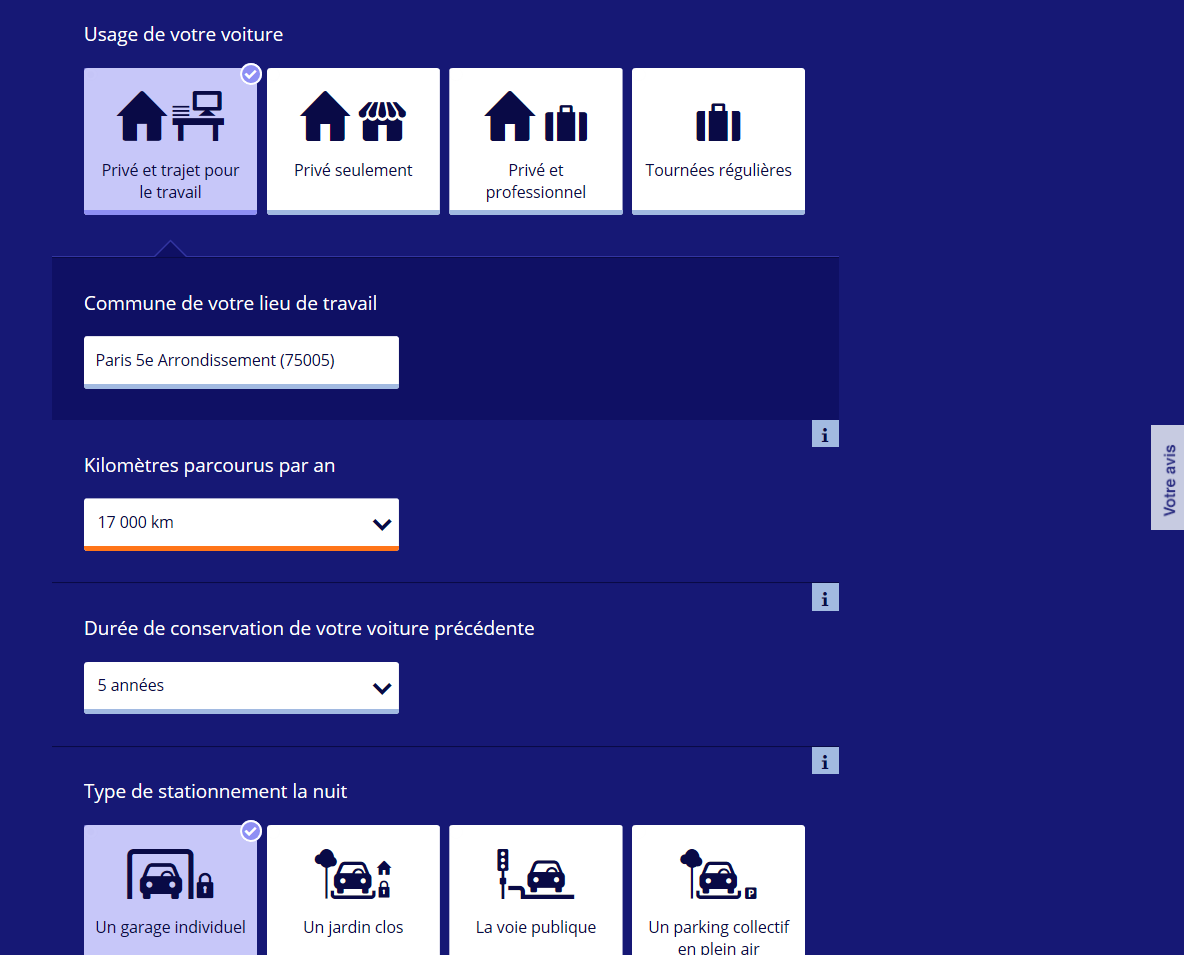
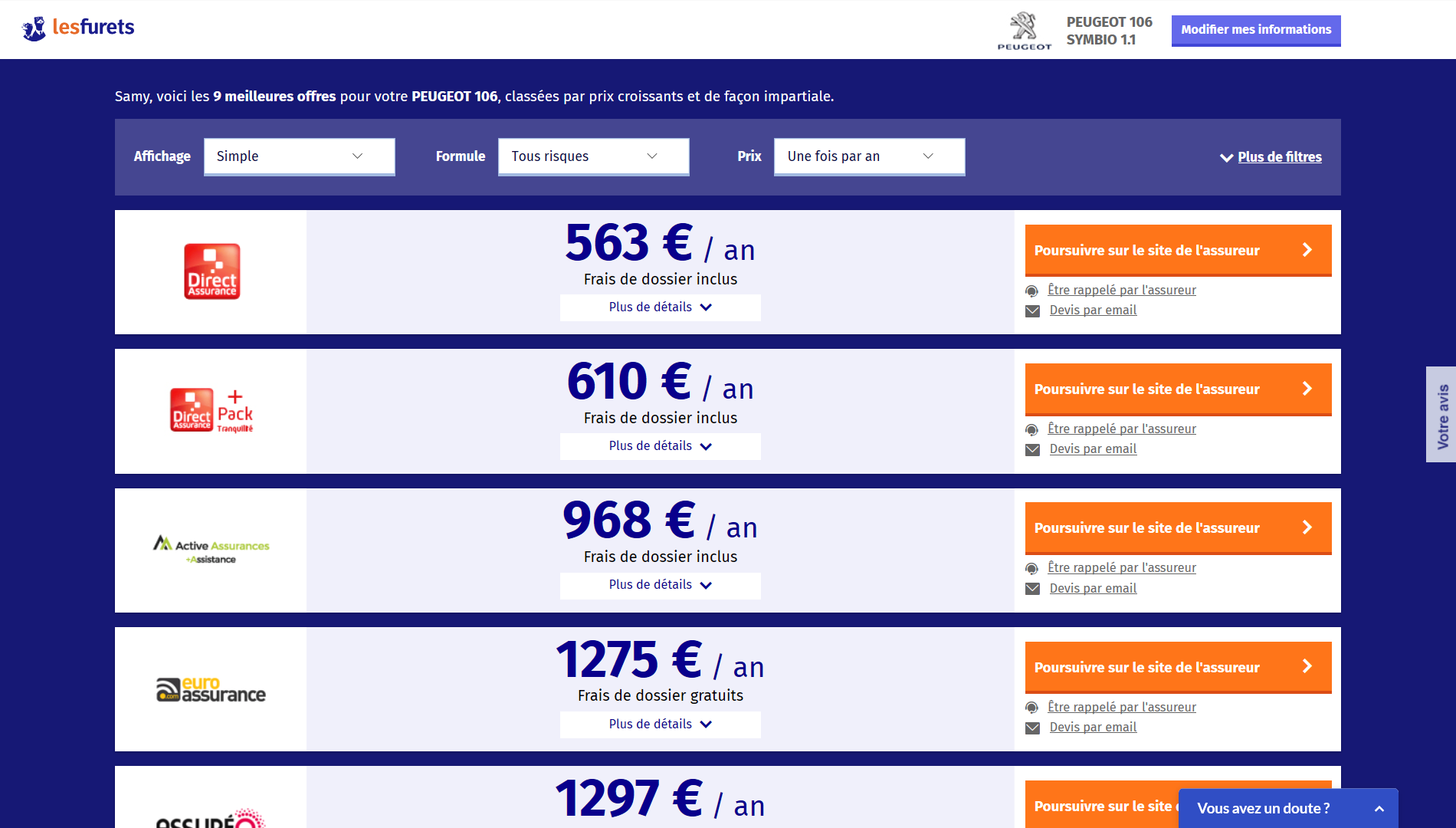
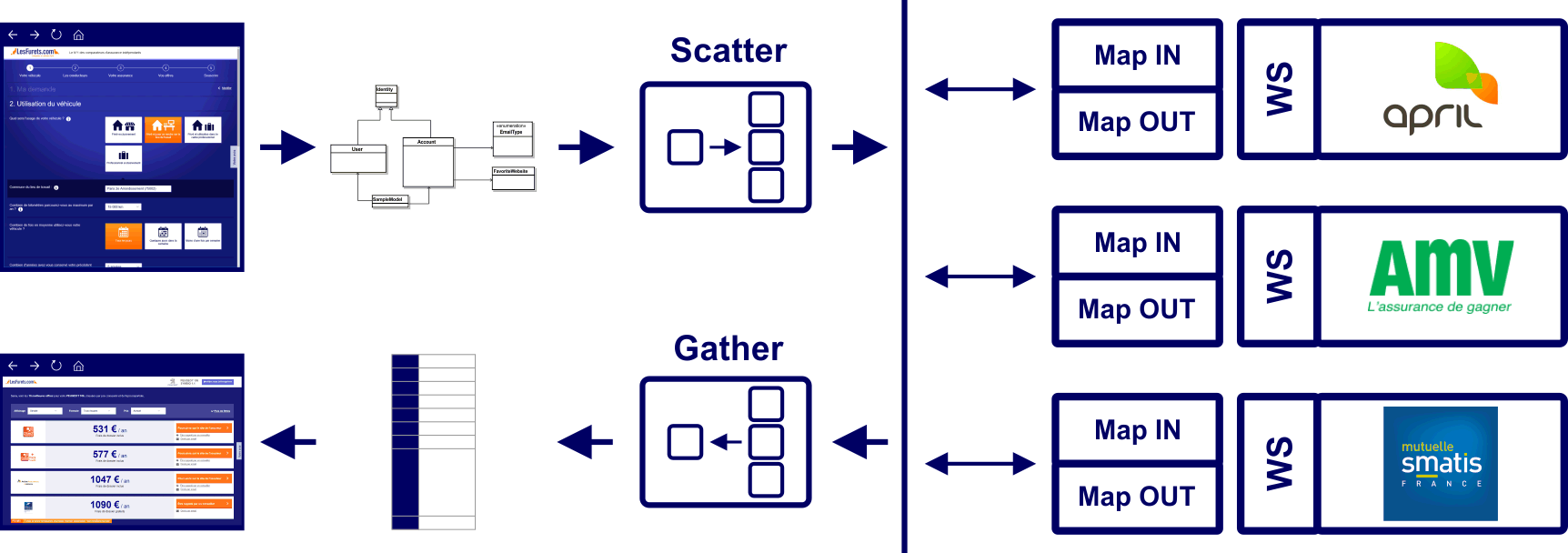
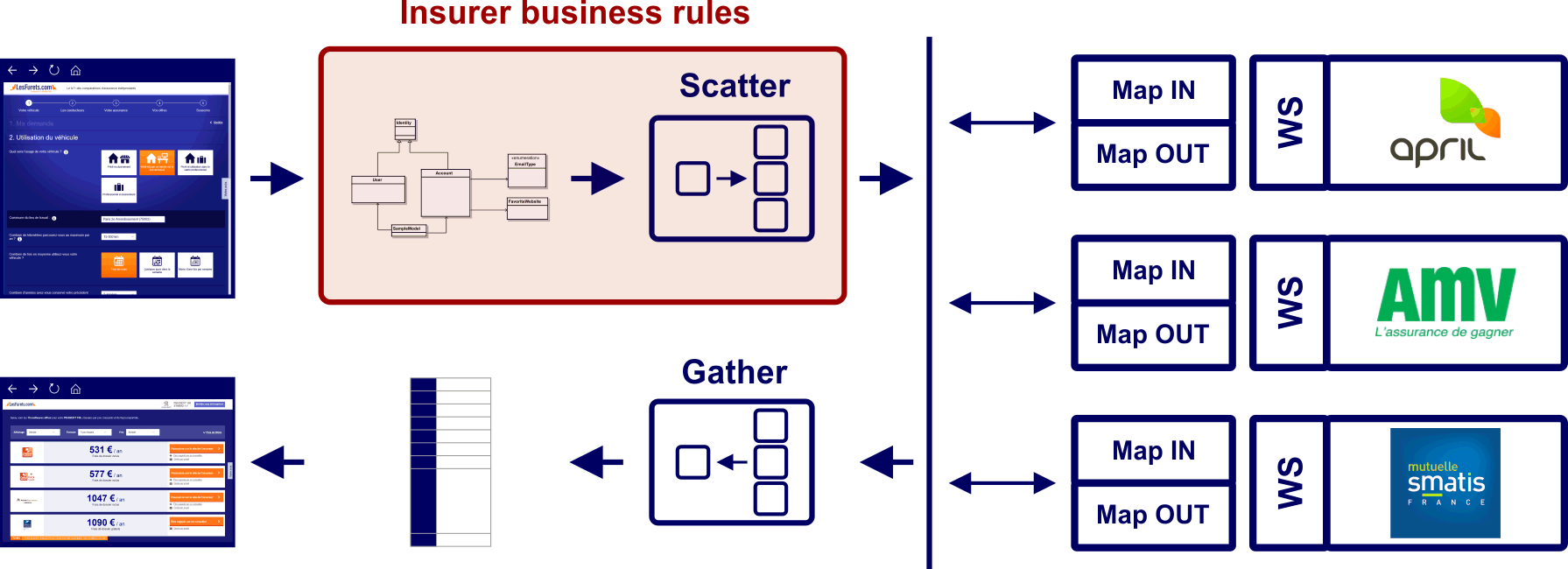
We have 71 live insurers, on 5 products, each with business validation rules, that filter prospects based on their profile
Hierarchy of 492 legacy classes, no governance or auditability
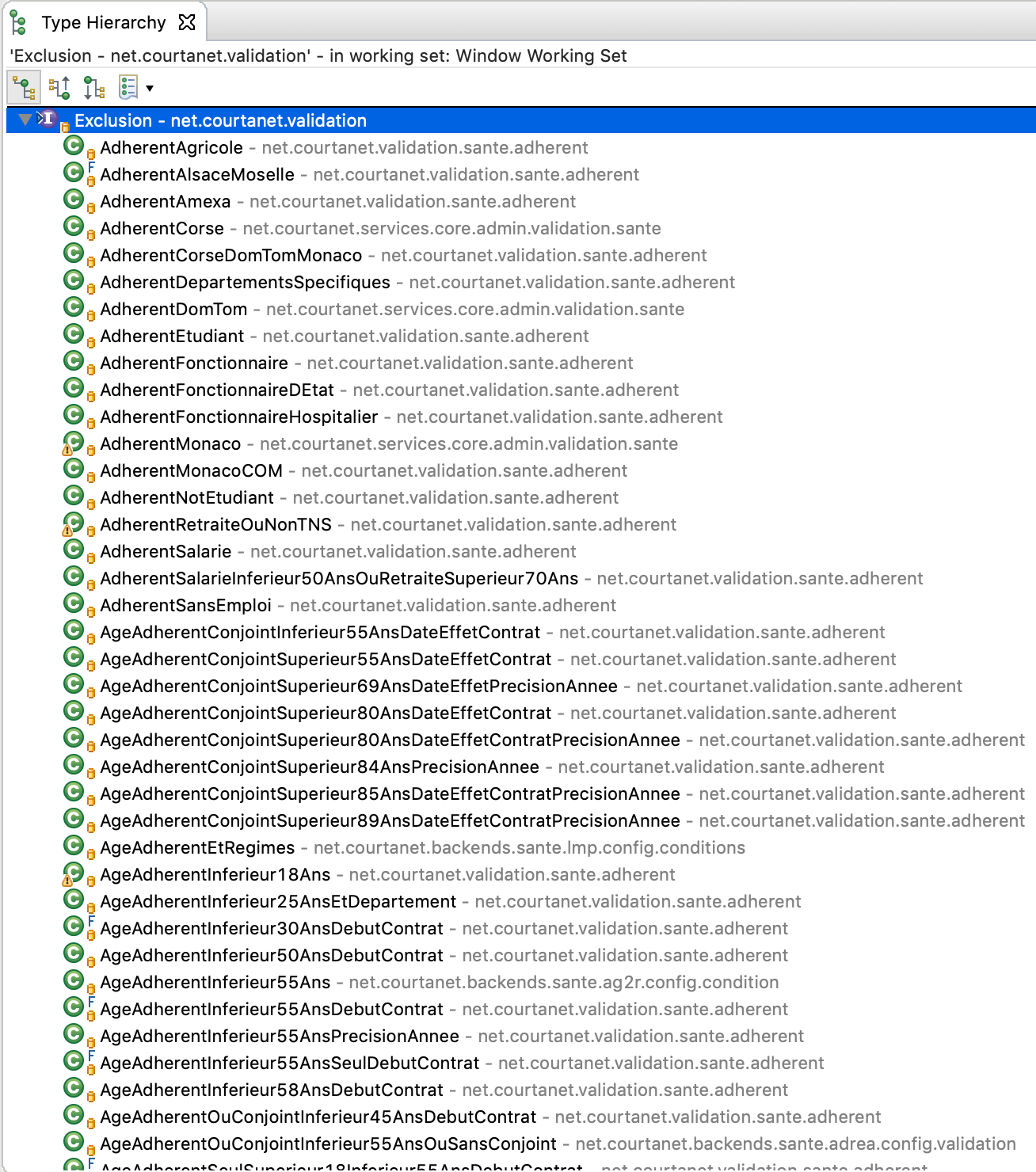
Insurer exclusions based on object model (legacy code)
public void check(FieldContext context, FormuleMoto formule, Conducteur conducteur,
Vehicule vehicule, Void unused, Besoins besoins,
Set<EAbTestingScenario> scenarios)
throws ExclusionException {
if (besoins == null) {
return;
}
if (besoins.getDateDebutContrat() == null) {
return;
}
if (!DateHelper.isAfter(besoins.getDateDebutContrat(),
DateHelper.ajouteJoursADate(DateHelper.getToday(), NBR_JOURS),
DateHelper.EPrecision.jour)) {
throw new ExclusionException(DATE_EFFET_PLUS_60_JOURS);
}
}
Same rule, more fluent:
public ExclusionRule exclusionRule() {
return DOOV.when(dateContrat().after(todayPlusDays(60)))
.exclusionRule();
}
Java is verbose, but you can reduce the noise and write code like natural language with a fluent API
// JUnit API
assertEquals(9, fellowshipOfTheRing.size());
assertTrue(fellowshipOfTheRing.contains(frodo, sam));
assertFalse(fellowshipOfTheRing.contains(sauron));
// AssertJ API (fluent)
assertThat(fellowshipOfTheRing).hasSize(9)
.contains(frodo, sam)
.doesNotContain(sauron);
New elements in Java 8 makes it easier to write a fluent API
// java.util.function (io.doov.core.dsl.impl.LogicalBinaryCondition)
left.predicate().and(right.predicate()).test(model, context)
// java.util.stream (io.doov.core.dsl.impl.LogicalNaryCondition)
steps.stream().anyMatch(s -> s.predicate().test(model, context))
// lambda and method reference (io.doov.core.dsl.impl.NumericCondition)
predicate(greaterThanMetadata(field, value),
(model, context) -> Optional.ofNullable(value),
(l, r) -> greaterThanFunction().apply(l, r));
Many popular libraries propose fluent APIs like
jOOQ, AssertJ, Apache Spark, etc.
Dataset<Row> averagePrice = prices
.filter(value.<String>getAs("insurer")
.equals("COOL insurer"))
.groupBy("product")
.agg(avg("price").as("average"))
.orderBy(desc("average"));
"A domain-specific language (DSL) is a computer language specialized to a particular application domain. This is in contrast to a general-purpose language (GPL), which is broadly applicable across domains"
Domain Object Oriented Validation
dOOv is a fluent API for typesafe domain model validation
key model
// Root class of model
class Model {
User user;
}
// Add key named EMAIL
enum ModelFieldId {
EMAIL;
}
// Annotate email field
class User {
@Path(field = EMAIL
readable = ...)
String email;
}
code generate
// dOOv typed field class
class DslModel {
StringFieldInfo userEmail;
}
write rules
// Create rules by using
// generated fields
// in DslModel
DslModel
.when(userEmail.eq(...))
.validate()
// Optionaly add rules
// to a registry
.registerOn(DEFAULT);
get model
// Get model from somewhere
// or instanciate it
User user = new User();
user.setEmail("e@mail.com");
Model model = new Model();
model.setUser(user);
execute
// Use executeOn method
DslModel.when(email.matches(...))
.validate()
.executeOn(model);
// Or use the registry
DEFAULT.stream()
.map(rule -> rule.executeOn(model));
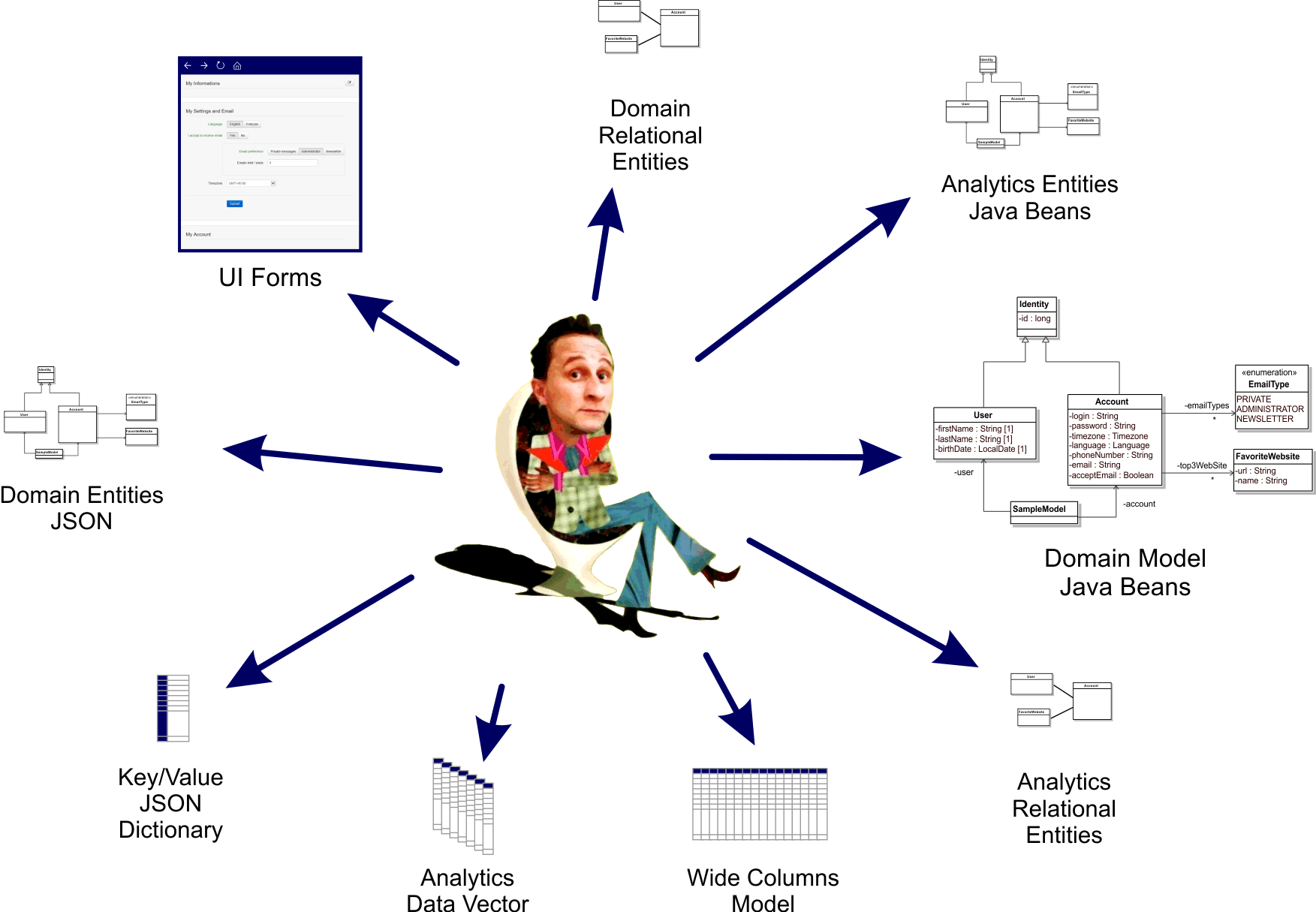
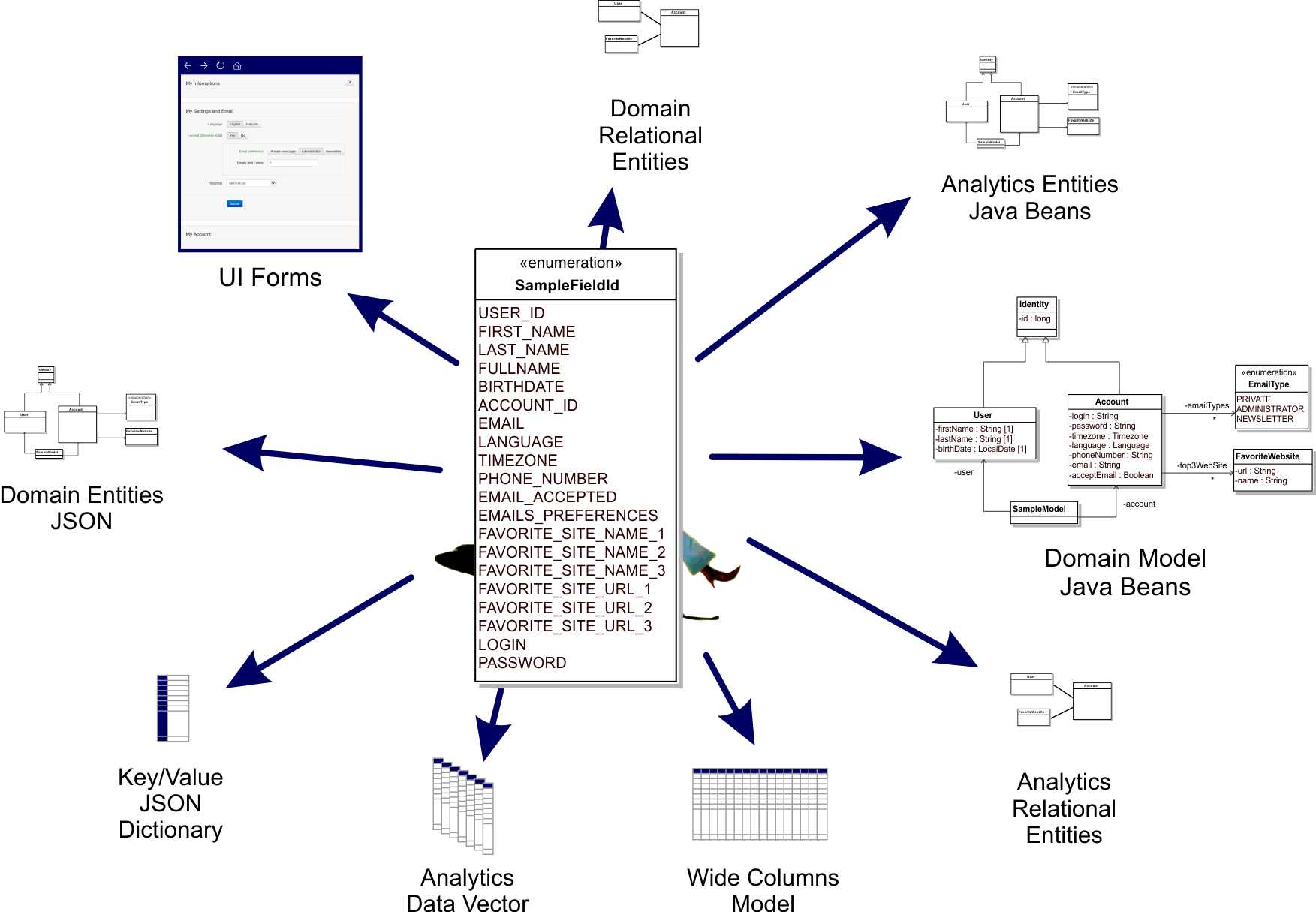
public class Account extends Identity {
@SamplePath(field = SampleFieldId.TIMEZONE,
readable = "account timezone")
private Timezone timezone;
@SamplePath(field = SampleFieldId.PHONE_NUMBER,
readable = "account phone number")
private String phoneNumber;
@SamplePath(field = SampleFieldId.EMAIL,
readable = "account email")
private String email;
@SamplePath(field = SampleFieldId.EMAIL_ACCEPTED,
readable = "account email accepted")
private boolean acceptEmail;
@SamplePath(field = SampleFieldId.EMAILS_PREFERENCES,
readable = "account préférences mail")
private Collection<EmailType> emailTypes = new HashSet<>();
}
public static boolean validateAccount(User user, Account account, Configuration config) {
if (config == null) {
return false;
}
if (user == null || user.getBirthDate() == null) {
return false;
}
if (account == null || account.getCountry() == null || account.getPhoneNumber() == null) {
return false;
}
if (YEARS.between(user.getBirthDate(), LocalDate.now()) >= 18
&& account.getEmail().length() <= config.getMaxEmailSize()
&& account.getCountry().equals(Country.FR)
&& account.getPhoneNumber().startsWith("+33")) {
return true;
}
return false;
}
public interface RulesConference {
SampleModelRule userAccount = DslSampleModel
// Entry point is when
.when(userBirthdate.ageAt(today()).greaterOrEquals(18)
.and(accountEmail.length().lesserOrEquals(configurationMaxEmailSize))
.and(accountCountry.eq(Country.FR))
.and(accountPhoneNumber.startsWith("+33")))
// Terminal operation is validate
.validate()
// Optional: add to registry
.registerOn(REGISTRY_DEFAULT);
}
public class RulesConferenceTest {
private SampleModel model;
@BeforeEach
public void before() {
model = SampleModels.sample();
}
@Test
public void should_default_user_account_validates() {
Result result = userAccount.executeOn(model);
assertThat(result).isTrue().hasNoFailureCause();
}
@Test
public void should_user_account_too_young_fail() {
model.getAccount().setPhoneNumber(null);
Result result = userAccount.executeOn(model);
assertThat(result).isFalse()
.hasFailureCause("account phone number starts with '+33'");
}
}
The entry point is DOOV#when(StepCondition) and the operation StepWhen#validate returns the validation rule
DOOV.when(accountEmail().matches("\\w+[@]\\w+\\.com")
.or(accountEmail().matches("\\w+[@]\\w+\\.fr")))
.validate();
This is lazy
We've used entry point DslSampleModel#when in the example: it makes typing simpler and more domain specific, but doesn't change execution.
A natural language version of the rule is available with ValidationRule#readable.
This makes auditability and compliance possible.
System.out.println("> " + EMAIL_VALID.readable());
> When (email matches '\w+[@]\w+\.com' or
email matches '\w+[@]\w+\.fr') validate
You can add the rule in one or many registry with ValidationRule#registerOn(Registry)
This makes governance possible.
DOOV.when(accountEmail().matches("\\w+[@]\\w+\\.com")
.or(accountEmail().matches("\\w+[@]\\w+\\.fr")))
.validate()
.registerOn(REGISTRY_ACCOUNT);
The terminal operation ValidationRule#executeOn(FieldModel)
executes the rule
REGISTRY_ACCOUNT.stream()
.map(rule -> rule.executeOn(model))
.filter(Result::isInvalid)
.map(Result::message)
.collect(toList());
The available operations depend on the field type, and the arguments are type safe and validated by the compiler
DOOV.when(userAccountCreation().after(LocalDate.of(2000, 01, 01))).validate();
// ^^^^^
// only for date field
DOOV.when(userAccountCreation().after(LocalDate.of(2000, 01, 01))).validate();
// ^^^^^^^^^^^^^^^^^^^ ^^^^^^^^^^^^^^^^^^^^^^^^^^^
// date field is type safe here
Makes readable text generation possible:
we can output a multi-language rules catalog
in multiple formats (text, markdown, HTML, etc.)
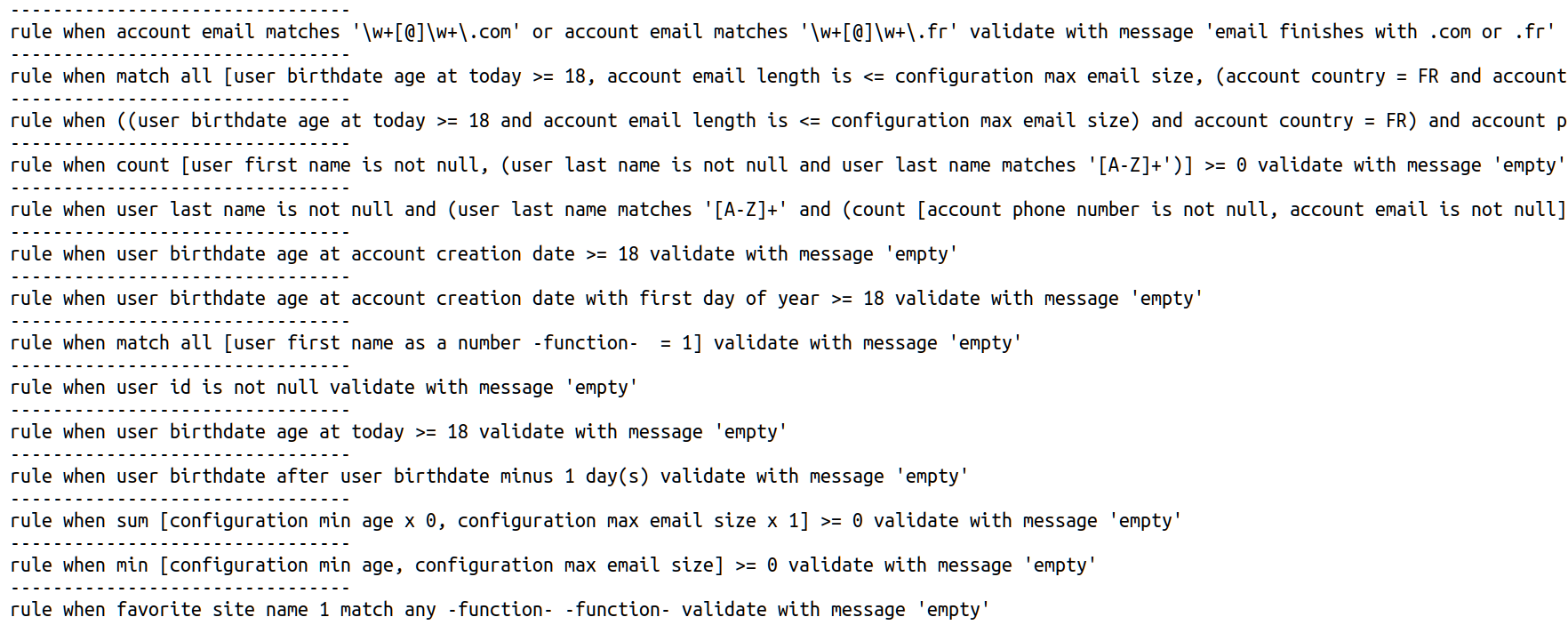
We generate a HTML validation rules catalog,
grouped by insurers and by insurance product
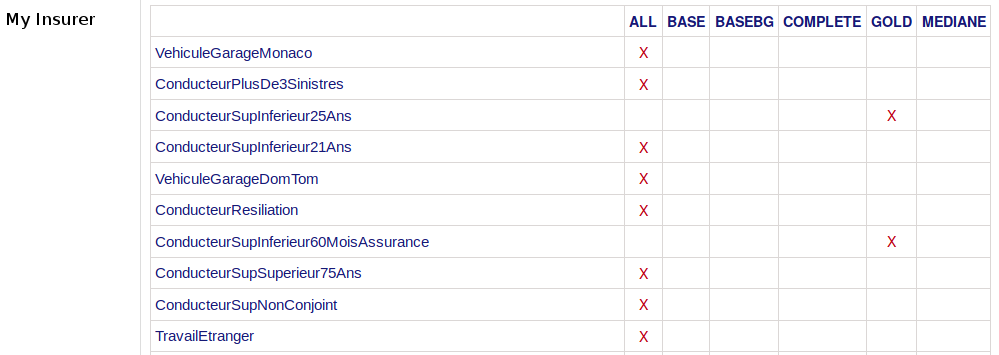
The syntax tree makes it possible to generate the rule as text. Notice how the elements from the tree are tokenized (operator, fields, etc.)

Also, the syntax tree makes it possible to see all the rules that applies for a specific field, for example the driver's date of birth.
The syntax tree is localized for left side elements (fields) and operators via MessageBundle.
// User.java
@SamplePath(field = SampleFieldId.FIRST_NAME,
readable = "user.first.name")
private String firstName;
// SampleResourceBundle_en_US.properties
user.first.name = user first name
// SampleResourceBundle_fr_FR.properties
user.first.name = prénom utilisateur
You can also specify the text directly in the readable field.
You can use ValidationRule#readable(Locale) and Result#getFailureCause(Locale) to specify a locale
// Output in default Locale.getDefault()
String readable = DOOV.when(userFirstName.isNotNull())
.readable())
System.out.println("> " + readable);
> when first name exists
// Output in french
String readable = DOOV.when(userFirstName.isNotNull())
.readable(Locale.FRANCE))
System.out.println("> " + readable)
> lorsque prénom utilisateur existe
During execution, each node of the AST captures context value and predicate result. We know at runtime which node failed, and why.

We make daily statistics that helps us shape the business,
by removing or tweaking rules as needed
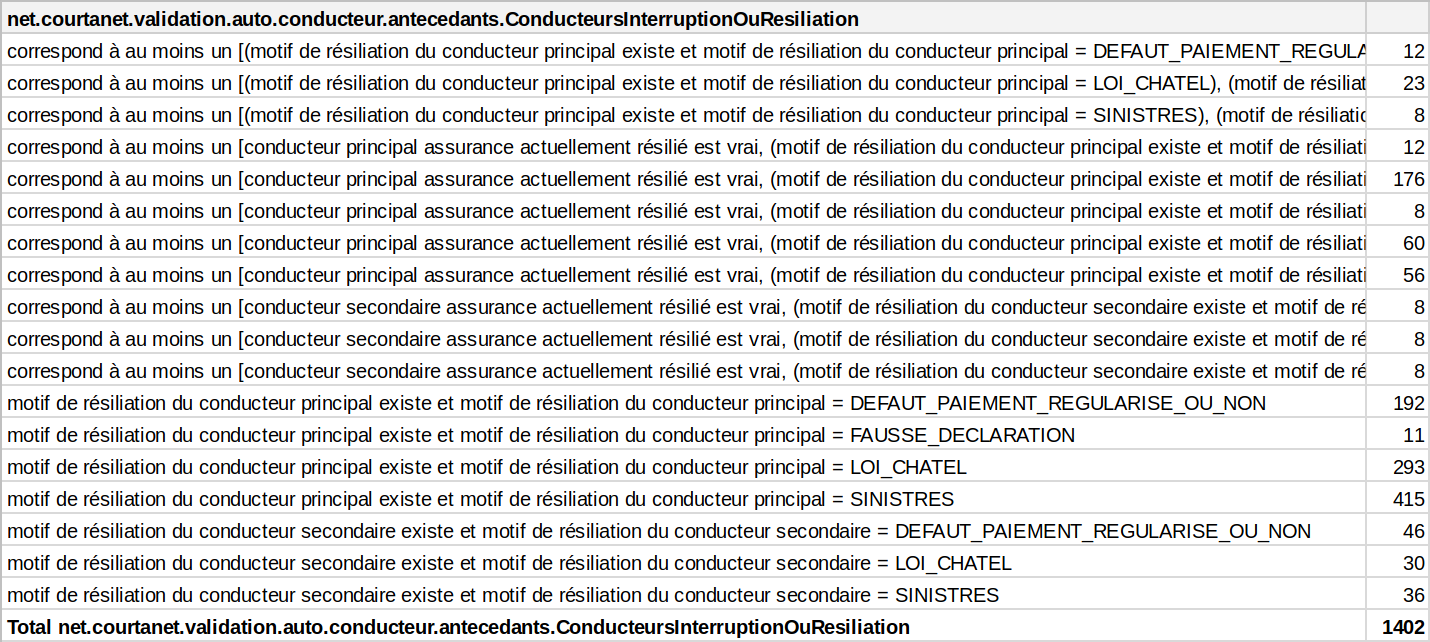
We also rewrite the execution rules by simplifying the predicate tree, to show the minimal predicate that fails.

Validate that the profile has an email with less than 20 characters, is at least 18 years old when the country is France, and the country is France when the phone number starts with '+33'
DOOV.when(accountEmail.length().lesserThan(20)
.and(userBirthdate.ageAt(today()).greaterThan(18)
.and(accountCountry.eq(Country.FR)))
.and(accountCountry.eq(Country.FR)
.and(accountPhoneNumber.startsWith("+33"))))
.validate();
model.getAccount().setEmail("test@test.org");
model.getAccount().setCountry(Country.FR);
model.getUser().setBirthDate(LocalDate.now().minusYears(19));
ValidationRule rule = DOOV
.when(accountEmail.length().lesserThan(20)
.and(userBirthdate.ageAt(today()).greaterThan(18)
.and(accountCountry.eq(Country.FR)))
.and(accountCountry.eq(Country.FR)
.and(accountPhoneNumber.startsWith("+33"))))
.validate();
Result result = rule.withShortCircuit(false)
.executeOn(wrapper);
System.out.println("> " + result.getFailureCause());
> account phone number starts with '+33'
Validate that the profile is least 18 years old, the country is France, the phone number starts with '+33', is at least 21 years old when their country is Canada, and their phone number starts with '+1'
DOOV.when(matchAny(
matchAll(userBirthdate.ageAt(today()).greaterThan(18),
accountCountry.eq(Country.FR),
accountPhoneNumber.startsWith("+33")),
matchAll(userBirthdate.ageAt(today()).greaterThan(21),
accountCountry.eq(Country.CAN),
accountPhoneNumber.startsWith("+1"))))
.validate();
model.getUser().setBirthDate(LocalDate.now().minusYears(22));
model.getAccount().setCountry(Country.FR);
ValidationRule rule = DOOV
.when(matchAny(
matchAll(userBirthdate.ageAt(today()).greaterThan(18),
accountCountry.eq(Country.FR),
accountPhoneNumber.startsWith("+33")),
matchAll(userBirthdate.ageAt(today()).greaterThan(21),
accountCountry.eq(Country.CAN),
accountPhoneNumber.startsWith("+1"))))
.validate();
Result result = rule.withShortCircuit(false)
.executeOn(wrapper);
System.out.println("> " + result.getFailureCause());
> match any [account phone number starts with '+33',
match all [account country = CAN,
account phone number starts with '+1']]
By default, predicate evaluation in dOOv behaves like Java: it short-circuits. This can be disabled to execute all nodes, even if they don't impact the end result.
We use JMH to check the performance of the DSL
Benchmark Mode Samples Mean Mean error Units
o.m.BenchmarkOldRule.valid_email thrpt 25 1860.553 42.269 ops/ms
o.m.BenchmarkRule.valid_email thrpt 25 1733.465 18.461 ops/ms
Performance of the DSL and POJO code are very close
Running the Bean Validation benchmark:
dOOv is faster in every category (hint: reflection API)
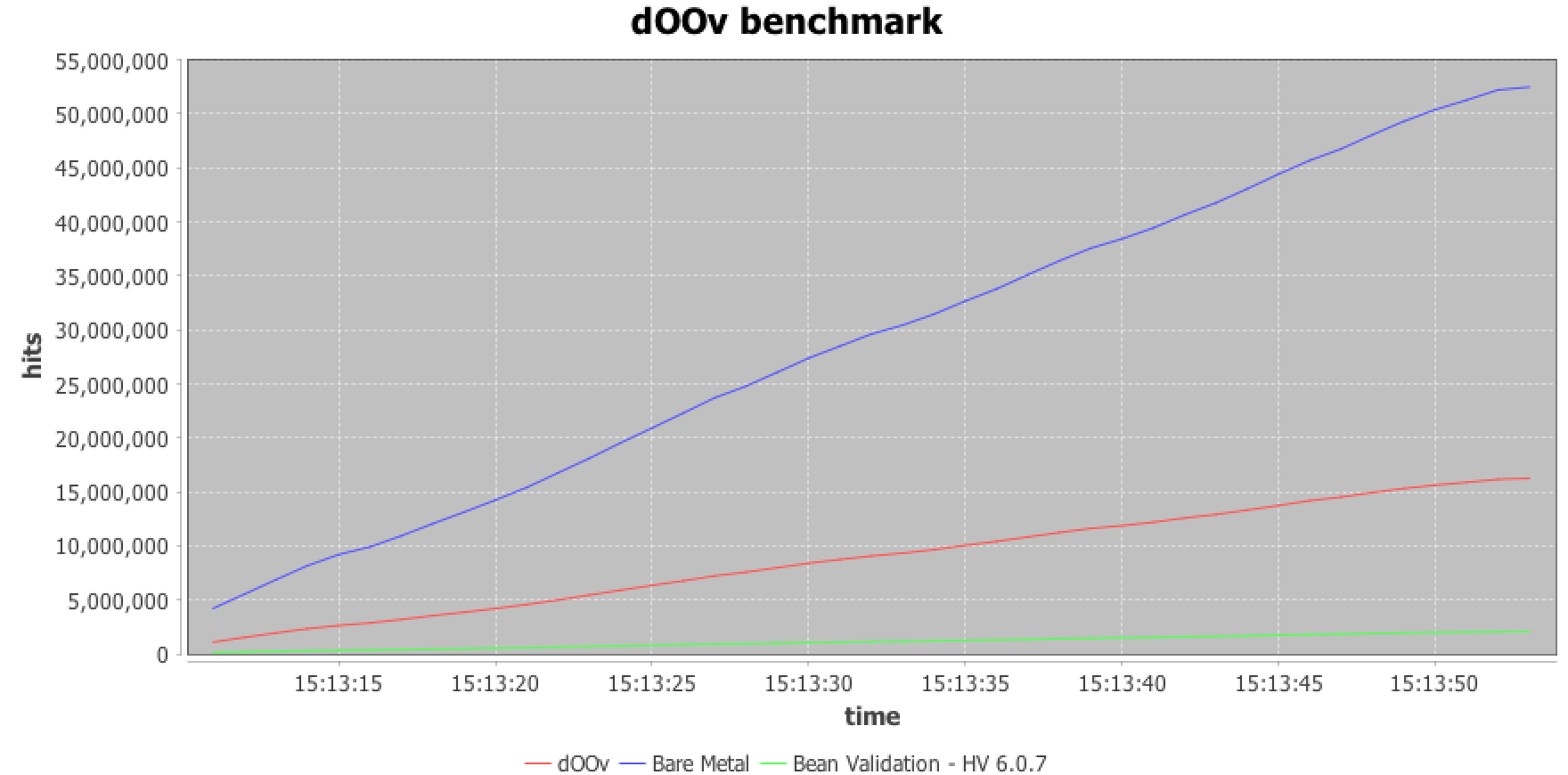
Bean Validation rules are not strongly typed since it's annotation based. This code will fail at compile time, but your IDE won't be able to tell you why.
public class Account {
@NotNull @Email
private Email email;
}
Because Bean Validation constraints are based on field annotation, cross validation between fields are only available through the extension mechanism.
public class Account {
@Pattern(regexp = "(FR)|(UK)")
private String country;
@Pattern(regexp = "???")
private String phoneNumber;
}
Bean Validation rules are not written with a natural language syntax and does not provide a syntax tree
@Size(min = 10, max = 200,
message = "About Me must be between 10 and 200 characters")
private String aboutMe;
userAboutMe().length().between(10, 200).validate().readable()
> When user about me length is between 10 and 200, validate
We migrated our 492 business rules to dOOv,
we now have compliance, auditability, governance, clarity
(and more!)
Next step is extending the DSL to create an object to object mapping framework, Domain Object Oriented Mapping (dOOm). It will feature the same AST to text and statistics functionnalities.
DOOV.map(userEmail().to(insurerEmail())
.map(userFirstName(), userLastName())
.using(StringJoiner)
.to(insurerFullName())
.when(userCountry().eq(FR))
.map(userPhone().to(insurerPhone()))
Stay tuned for the next versions!
Validate that a profile
has an email with less than 20 characters
has at least 18 years when their country is France
their country is France when their phone number starts with '+33'
DOOV.when(accountEmail.length().lesserThan(20)
.and(userBirthdate.ageAt(today()).greaterThan(18)
.and(accountCountry.eq(Country.FR)))
.and(accountCountry.eq(Country.FR)
.and(accountPhoneNumber.startsWith("+33"))))
.validate();
model.getAccount().setEmail("test@test.org");
model.getAccount().setCountry(Country.FR);
model.getUser().setBirthDate(LocalDate.now().minusYears(19));
ValidationRule rule = DOOV
.when(accountEmail.length().lesserThan(20)
.and(userBirthdate.ageAt(today()).greaterThan(18)
.and(accountCountry.eq(Country.FR)))
.and(accountCountry.eq(Country.FR)
.and(accountPhoneNumber.startsWith("+33"))))
.validate();
Result result = rule.withShortCircuit(false)
.executeOn(wrapper);
System.out.println("> " + result.getFailureCause());
> account phone number starts with '+33'
Validate that a profile
has at least 18 years when their country is France
and their phone number starts with '+33'
has at least 21 years when their country is Canadian
and their phone number starts with '+1'
DOOV.when(userBirthdate.ageAt(today()).greaterThan(18)
.and(accountCountry.eq(Country.FR)
.and(accountPhoneNumber.startsWith("+33")))
.or(userBirthdate.ageAt(today()).greaterThan(21)
.and(accountCountry.eq(Country.CAN)
.and(accountPhoneNumber.startsWith("+1")))))
.validate();
model.getUser().setBirthDate(LocalDate.now().minusYears(22));
model.getAccount().setCountry(Country.FR);
ValidationRule rule = DOOV
.when(userBirthdate.ageAt(today()).greaterThan(18)
.and(accountCountry.eq(Country.FR)
.and(accountPhoneNumber.startsWith("+33")))
.or(userBirthdate.ageAt(today()).greaterThan(21)
.and(accountCountry.eq(Country.CAN)
.and(accountPhoneNumber.startsWith("+1")))))
.validate();
Result result = rule.withShortCircuit(false)
.executeOn(wrapper);
System.out.println("> " + result.getFailureCause());
> account phone number starts with '+33'
or (account country = CAN and
account phone number starts with '+1')
Validate that a profile
has at least 18 years when their country is France
and their phone number starts with '+33'
has at least 21 years when their country is Canadian
and their phone number starts with '+1'
DOOV.when(matchAny(
matchAll(userBirthdate.ageAt(today()).greaterThan(18),
accountCountry.eq(Country.FR),
accountPhoneNumber.startsWith("+33")),
matchAll(userBirthdate.ageAt(today()).greaterThan(21),
accountCountry.eq(Country.CAN),
accountPhoneNumber.startsWith("+1"))))
.validate();
model.getUser().setBirthDate(LocalDate.now().minusYears(22));
model.getAccount().setCountry(Country.FR);
ValidationRule rule = DOOV
.when(matchAny(
matchAll(userBirthdate.ageAt(today()).greaterThan(18),
accountCountry.eq(Country.FR),
accountPhoneNumber.startsWith("+33")),
matchAll(userBirthdate.ageAt(today()).greaterThan(21),
accountCountry.eq(Country.CAN),
accountPhoneNumber.startsWith("+1"))))
.validate();
Result result = rule.withShortCircuit(false)
.executeOn(wrapper);
System.out.println("> " + result.getFailureCause());
> match any [account phone number starts with '+33',
match all [account country = CAN,
account phone number starts with '+1']]
Validate that a profile country is Canadian or French
DOOV.when(accountCountry.anyMatch(Country.CAN, Country.FR))
.validate();
model.getAccount().setCountry(Country.UK);
ValidationRule rule = DOOV
.when(accountCountry.anyMatch(Country.CAN, Country.FR))
.validate();
Result result = rule.withShortCircuit(false)
.executeOn(wrapper);
System.out.println("> " + result.getFailureCause());
> account country != UK
Validate that a profile match at least two conditions :
DOOV.when(count(
userBirthdate.ageAt(today()).greaterThan(18),
accountCountry.eq(Country.FR),
accountPhoneNumber.startsWith("+33")).greaterThan(1))
.validate();
model.getUser().setBirthDate(LocalDate.now().minusYears(19));
model.getAccount().setCountry(Country.CAN);
model.getAccount().setPhoneNumber("1 23 45 67 89");
ValidationRule rule = DOOV
.when(count(
userBirthdate.ageAt(today()).greaterThan(18),
accountCountry.eq(Country.FR),
accountPhoneNumber.startsWith("+33"))
.greaterThan(1))
.validate();
Result result = rule.withShortCircuit(false)
.executeOn(wrapper);
System.out.println("> " + result.getFailureCause());
> account country = FR and account phone number starts with '+33'